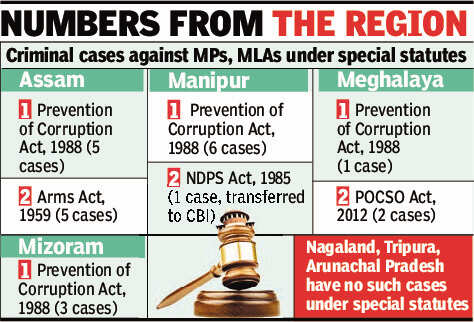
GUWAHATI: Senior Supreme Court advocate and amicus curiae Vijay Hansaria, in a PIL of 2016 seeking speedy disposal of criminal cases against the present and former elected representatives to Parliament and state legislatures, has stated in a supplementary report that there are no special courts for trying 35 such pending cases in Assam.

The supplementary report, which was filed in the Supreme Court on Tuesday by Sneha Kalita, Advocate On Record of Supreme Court and assisting counsel of the amicus curiae, states that in Assam “there is no special court and the cases are pending in the respective jurisdictional courts. There are 35 cases pending in different courts in 14 districts.”
Ten of the 35 pending cases in the state are under special statues.
According to the report, seven cases are under Prevention of Corruption Act, 1988 of which two cases relate to the FIR registered in the year 2007 against sitting MLA of Arunachal Pradesh, and charges have not been framed yet. Another five cases are under the Arms Act, 1959.
“There is no uniformity as to the setting up of special courts for MPs/MLAs throughout the country. In the states of Andhra Pradesh, Karnataka, Madhya Pradesh, Telangana and West Bengal, there is one special court for all cases against MPs/MLAs. In the state of Telangana, apart from Special Court for MPs/MLAs, cases are also pending before Special Court, CBI. In all other states, these cases are pending in respective jurisdictional courts,” the report states.
It adds, “There is also no clarity as to the courts which are trying offences under Prevention of Corruption Act, 1988. Similar is the situation with regard to offences punishable under Prevention of Money Laundering Act, 2002.”
The report states that trials in most of the states have been held up due to the pandemic situation. “Witnesses have not been examined and charges have not been framed in the absence of physical presence of the accused and/or witnesses. However, two high courts, namely, Karnataka and Delhi, have framed rules for conducting judicial proceedings by video conferencing, including examination of witnesses, judicial remand, framing of charge, examination of accused and proceedings under Section 164 Cr.P.C,” the report adds.
The amicus curiae has submitted that each HC may be directed to assign or allocate criminal cases involving former and sitting legislators to one judicial officer in each 11 district, both for sessions courts and magisterial courts as Special Court MP/MLA, and the HCs may be directed to prepare a blueprint for expeditious disposal of the cases not later than one year for conclusion of trial.
The amicus curie has also submitted that special courts will give priority to the trial of cases in offences punishable with death or life imprisonment followed by offences under Prevention of Corruption Act, 1988 and Prevention of Money Laundering Act, 2002, Schedule Caste and Schedule Tribes (Prevention of Atrocities) Act, 1989 and offences under Protection of Children from Sexual Offences Act, 2012, offences punishable with imprisonment for 7 years or more, other offences. “Cases involving sitting legislators be given priority over former legislators. No adjournment shall be granted, except in rare and exceptional circumstances, on a written application stating the ground of adjournment and for reasons to be recorded,” the amicus curiae submitted.

The supplementary report, which was filed in the Supreme Court on Tuesday by Sneha Kalita, Advocate On Record of Supreme Court and assisting counsel of the amicus curiae, states that in Assam “there is no special court and the cases are pending in the respective jurisdictional courts. There are 35 cases pending in different courts in 14 districts.”
Ten of the 35 pending cases in the state are under special statues.
According to the report, seven cases are under Prevention of Corruption Act, 1988 of which two cases relate to the FIR registered in the year 2007 against sitting MLA of Arunachal Pradesh, and charges have not been framed yet. Another five cases are under the Arms Act, 1959.
“There is no uniformity as to the setting up of special courts for MPs/MLAs throughout the country. In the states of Andhra Pradesh, Karnataka, Madhya Pradesh, Telangana and West Bengal, there is one special court for all cases against MPs/MLAs. In the state of Telangana, apart from Special Court for MPs/MLAs, cases are also pending before Special Court, CBI. In all other states, these cases are pending in respective jurisdictional courts,” the report states.
It adds, “There is also no clarity as to the courts which are trying offences under Prevention of Corruption Act, 1988. Similar is the situation with regard to offences punishable under Prevention of Money Laundering Act, 2002.”
The report states that trials in most of the states have been held up due to the pandemic situation. “Witnesses have not been examined and charges have not been framed in the absence of physical presence of the accused and/or witnesses. However, two high courts, namely, Karnataka and Delhi, have framed rules for conducting judicial proceedings by video conferencing, including examination of witnesses, judicial remand, framing of charge, examination of accused and proceedings under Section 164 Cr.P.C,” the report adds.
The amicus curiae has submitted that each HC may be directed to assign or allocate criminal cases involving former and sitting legislators to one judicial officer in each 11 district, both for sessions courts and magisterial courts as Special Court MP/MLA, and the HCs may be directed to prepare a blueprint for expeditious disposal of the cases not later than one year for conclusion of trial.
The amicus curie has also submitted that special courts will give priority to the trial of cases in offences punishable with death or life imprisonment followed by offences under Prevention of Corruption Act, 1988 and Prevention of Money Laundering Act, 2002, Schedule Caste and Schedule Tribes (Prevention of Atrocities) Act, 1989 and offences under Protection of Children from Sexual Offences Act, 2012, offences punishable with imprisonment for 7 years or more, other offences. “Cases involving sitting legislators be given priority over former legislators. No adjournment shall be granted, except in rare and exceptional circumstances, on a written application stating the ground of adjournment and for reasons to be recorded,” the amicus curiae submitted.

Coronavirus outbreak
Trending Topics
LATEST VIDEOS
City
 On cam: Elderly woman brutally thrashed for objecting to eve-teasing in Ghaziabad
On cam: Elderly woman brutally thrashed for objecting to eve-teasing in Ghaziabad  Odisha: 4-feet-long cobra rescued from a toilet in Ekachalia village
Odisha: 4-feet-long cobra rescued from a toilet in Ekachalia village  On cam: 35-year-old woman dies of electrocution after she steps on a live wire in Chennai
On cam: 35-year-old woman dies of electrocution after she steps on a live wire in Chennai  Government prohibits onion exports as prices treble in a month
Government prohibits onion exports as prices treble in a month
More from TOI
Navbharat Times
Featured Today in Travel
Quick Links
Kerala Coronavirus Helpline NumberHaryana Coronavirus Helpline NumberUP Coronavirus Helpline NumberBareilly NewsBhopal NewsCoronavirus in DelhiCoronavirus in HyderabadCoronavirus in IndiaCoronavirus symptomsCoronavirusRajasthan Coronavirus Helpline NumberAditya ThackerayShiv SenaFire in MumbaiAP Coronavirus Helpline NumberArvind KejriwalJammu Kashmir Coronavirus Helpline NumberSrinagar encounter
Get the app



